Reply 100 of 120, by bjwil1991
- Rank
- l33t
I'm trying to play the game on my PSP and it comes up as data is corrupted.
Discord: https://discord.gg/U5dJw7x
Systems from the Compaq Portable 1 to Ryzen 9 5950X
Twitch: https://twitch.tv/retropcuser
I'm trying to play the game on my PSP and it comes up as data is corrupted.
Discord: https://discord.gg/U5dJw7x
Systems from the Compaq Portable 1 to Ryzen 9 5950X
Twitch: https://twitch.tv/retropcuser
Hmmm I have a real mode 386 emulator somewhere, wonder what my Tandy 1000rlx would do with it
wrote:I'm trying to play the game on my PSP and it comes up as data is corrupted.
As it's not an official game, you have to be running CFW on the PSP, which disables signature checks, then the game will start.
I installed the CFW 6.61 Infinity Pro on my PSP and the game now works. Thanks.
Discord: https://discord.gg/U5dJw7x
Systems from the Compaq Portable 1 to Ryzen 9 5950X
Twitch: https://twitch.tv/retropcuser
I've found a few new bugs in your game. I'm not using real hardware though, I'm using the 86box emulator which is far more accurate than Dosbox. (it actually runs 8088mph properly for instance)
If these are emulation bugs, just let me know.
*When using Sound Blaster MIDI output (choose SB-MIDI 220h, haven't tried 240h, though the midi output on the Sound Blaster should still be 330h I think) the instrument selection is different on the main menu (kick drum and snare drum) from when using a dedicated MPU-401 (address 330h) which uses only a bongo type drum.
*Also when using Sound Blaster MIDI output as above, the timing sounds off whereas when using a dedicated MPU-401 the timing sounds correct (I think, it's a little harder to hear for sure with the bongo).
*When starting a game with dedicated MPU-401 (address 330h) the game goes to a black screen and freezes.
Also some feature requests:
*When re-selecting MIDI as the sound output, allow to also re-select which device and address the MIDI output is at. Currently you must select a different type of sound output, then select MIDI again in order to get the menu.
*Add an explosion effect for the bombs
*Add support for Sound Blaster OPL2 (I think this is just a matter of giving a choice of device address location. Adlib is at 388h, Sound Blaster can be at 220h, 240h, 260h, or 280h and is denoted with the BLASTER environment variable)
wrote:*When using Sound Blaster MIDI output (choose SB-MIDI 220h, haven't tried 240h, though the midi output on the Sound Blaster should still be 330h I think) the instrument selection is different on the main menu (kick drum and snare drum) from when using a dedicated MPU-401 (address 330h) which uses only a bongo type drum.
*Also when using Sound Blaster MIDI output as above, the timing sounds off whereas when using a dedicated MPU-401 the timing sounds correct (I think, it's a little harder to hear for sure with the bongo).
*When starting a game with dedicated MPU-401 (address 330h) the game goes to a black screen and freezes.
This is weird, it's exactly the same MIDI messages over both SB-MIDI and MPU-401. Could it be that your emulator is configured so that there's an MT-32 (or its MIDI mapping) on the MPU-401 port, whereas the emulated SB-MIDI has a General MIDI mapping?
wrote:Add support for Sound Blaster OPL2 (I think this is just a matter of giving a choice of device address location. Adlib is at 388h, Sound Blaster can be at 220h, 240h, 260h, or 280h and is denoted with the BLASTER environment variable)
Was there actually any Sound Blaster hardware that didn't have the OPL chip exposed at 0x388, and JUST at the SB base address? IMHO it would just be a theoretical exercise with no real world application.
Now also playable in Chrome and Firefox via the Internet Archive's DOSBox port: https://archive.org/details/loon8r50
A new version of the game is out, I have ported it to the GBA, and the DOS, 3DS and PSP ports have also been updated 😀
Since I went for a bit more sophisticated visual style, it might not run as well on older (pre-486) machines as older releases, but I think it's worth it (and didn't want to be limited by older machines this time around).
The game now also has a global leaderboard: https://loonies.thp.io/
Now, how are scores submitted to the global leaderboard you ask? Easy -- once you achieve a high score and enter your name, the game will show a full-screen QR code that you can scan with your smartphone and visit the submission URL -- no DOS TCP stack necessary 😉
Also, in addition to the default English and German localisations, there's also a French translation now.
If anyone wants to do an updated YouTube video / review of the game, that'd be appreciated 😀
Screenshots from the DOS version (screenshot made in DOSBox):
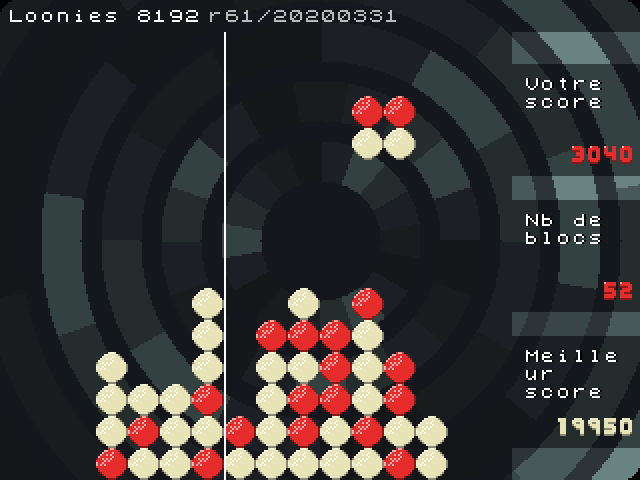
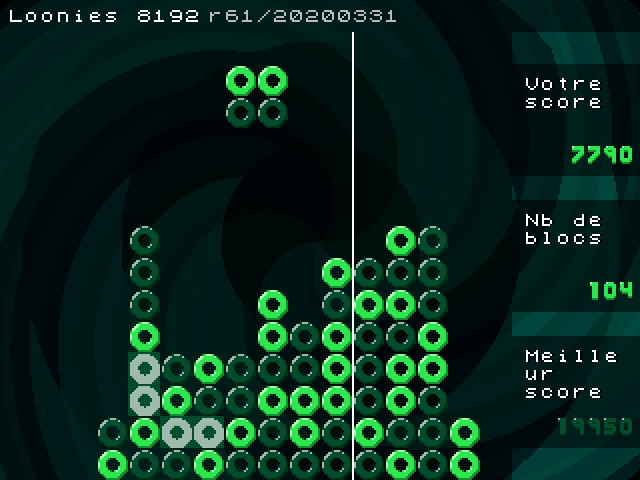
Some more information in the itch.io devlog: https://thp.itch.io/loonies-8192/devlog/13450 … ow-also-for-gba
Project website: https://thp.io/2018/loonies8192/
Updated DOS build attached (also available on the project website and on itch.io).
Thomas will join me for a live stream on Sunday, May 3rd at 20:30 CEST (18:30 UTC, 13:30 EST). We will have a look at the Loonies source and ramble on about coding and stuff.
Link to the stream:
Hi,
just a quick message to say I have tested the latest version(8R61) on 3 machines and it works great on all:
286-20 MHz, 1 MB 0 wait RAM, Chips NEAT chipset, Trident 8900B VGA, Sound blaster 1350B, MS DOS 6.22
386 SX 33 MHz, 4 MB RAM, OAK OTI-077 VGA, Microsoft Windows Sound system 16-bit ISA soundcard(1992), MS DOS 6.22
Compaq Presario 2232, Cyrix Media GX 133 MHz, 30 MB RAM, On Chip Cyrix VGA, on chip Cyrix Sound Blaster 16 compatible sound, MS DOS 7
Really fun cool little game, thanks!
286 20MHz,1MB RAM,Trident 8900B 1MB, Conner CFA-170A.SB 1350B
386SX 33MHz,ULSI 387,4MB Ram,OAK OTI077 1MB. Seagate ST1144A, MS WSS audio
Amstrad PC 9486i, DX/2 66, 16 MB RAM, Cirrus SVGA,Win 95,SB 16
Cyrix MII 333,128MB,SiS 6326 H0 rev,ESS 1869,Win ME
BSA Starfire wrote on 2020-05-02, 14:28:just a quick message to say I have tested the latest version(8R61) on 3 machines and it works great on all: […]
just a quick message to say I have tested the latest version(8R61) on 3 machines and it works great on all:
286-20 MHz, 1 MB 0 wait RAM, Chips NEAT chipset, Trident 8900B VGA, Sound blaster 1350B, MS DOS 6.22
386 SX 33 MHz, 4 MB RAM, OAK OTI-077 VGA, Microsoft Windows Sound system 16-bit ISA soundcard(1992), MS DOS 6.22
Compaq Presario 2232, Cyrix Media GX 133 MHz, 30 MB RAM, On Chip Cyrix VGA, on chip Cyrix Sound Blaster 16 compatible sound, MS DOS 7Really fun cool little game, thanks!
Thanks 😀 I guess the VGA card really helps in the 286. Glad you enjoy it 😀
The source code of Loonies 8192 (r50, from 2019) is now available under the GNU GPLv2 here:
https://thp.io/2018/loonies8192/loonies-r50-src.zip
And as root42 mentioned, the live stream was today and the recording is now available here:
https://youtu.be/e7vSSpXMv_w
thp wrote on 2020-04-01, 20:14:A new version of the game is out, I have ported it to the GBA, and the DOS, 3DS and PSP ports have also been updated :)
Will you do the eReader (printable Dot-Codes) version as well?
No plans for eReader, as I don't have a printer or eReader for testing this.
BUT! r62 has just been released, which adds a PSX (PS1) port. The DOS, 3DS, PSP and GBA builds have also been updated. Updated DOS version attached to this thread, the other platforms can be downloaded from https://thp.itch.io/loonies-8192
Since last year, three new ports have been released:
First, the Android port, which is available on Google Play.
In addition to that, I had a NDS port ready for some time, but never bothered to implement audio support. It still doesn't have audio support, but it's released now -- the game fits nicely on the NDS screen.
And finally, the game has been ported to Win32 (well, I always had a SDL2 port for testing during development, but now it is scripted to cross-compile to Windows), so if for some reason, you can't run DOSBox, you could always give the native version a try (it uses SDL2 and mingw-w64, so might not support older versions of Windows).
As always, the updated DOS version is attached to this thread, the builds for other platforms can be downloaded from https://thp.itch.io/loonies-8192
A new version is available for DOS (the other ports will be updated in the next days).
In addition to the 16-bit Borland C++ build, there's now a 32-bit build using DJGPP. Depending on how it goes, if there will be future versions, it could be that Borland C++ (16-bit) is dropped, as it's a bit easier to maintain the 32-bit version with virtual memory, protected mode, and all (also, DJGPP has GCC 10.2, which of course is a lot more modern than Borland C++ 3 from the early 1990s). The 32-bit version for example has more background patterns (color cycling), because it has more RAM available at runtime to keep track of them all (without going to EMS or XMS or any of the other DOS hacks).
Most of the improvements are related to ports that use the touch screen (no mouse support in the DOS port yet), but the game has been updated graphically and some DOS-related VGA rendering issues have also been fixed as part of this update.
An enhanced port, "Loonies (2021)" with a new soundtrack and new artwork is now available on Itch.io: https://thp.itch.io/loonies
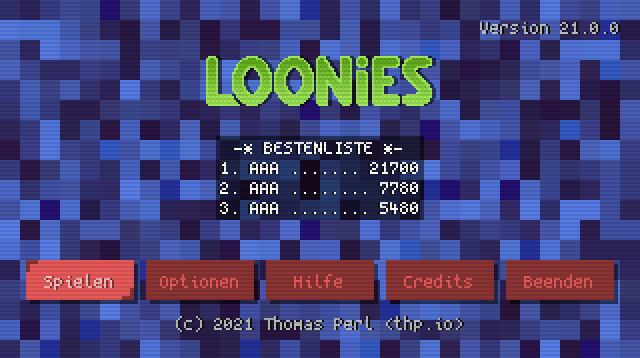
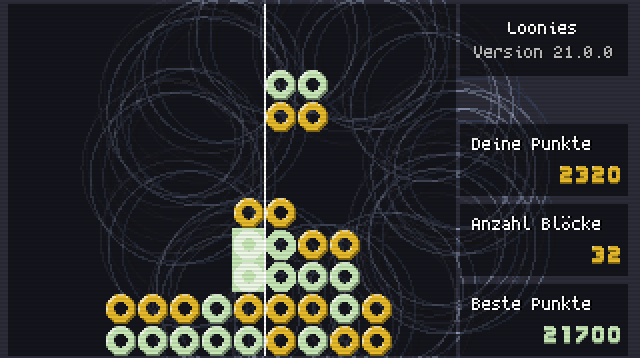
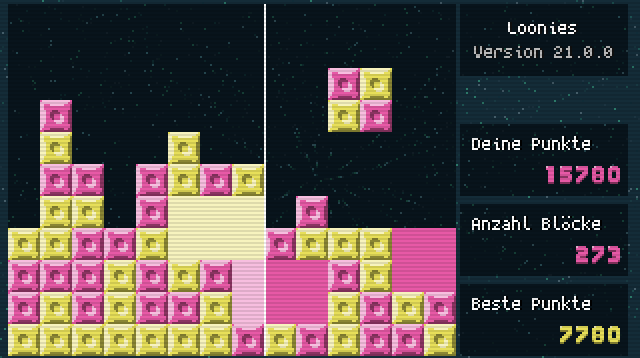
New ports just dropped:
The last one might be the most interesting to Vogons members. While there is a 16-bit DOS port (using Borland C++) and a 32-bit DOS port (using DJGPP), this adds two ports using OpenWatcom, and an alternative way of OPL FM Synth on compatible cards (via the Windows FM Synth MIDI driver):
OpenWatcom provides a way to build 16-bit Windows apps, and I was able to build it, but due to the size constraints (16-bit pointers, segmented memory models and all that) it did have some issues that I didn't bother to debug, especially as I don't have any pre-386 CPUs (in fact, Pentium II and K6-II is the lowest that still work here at the moment). So 16-bit Windows, but requiring a 32-bit processor is where it's at.
Both builds handle drawing using GDI (apparently with VfW it could blit even faster, but it worked fine on the machines I have, and it just needs a stock Windows 3.11 install, no additional dependencies, which is also nice), and while 16-color mode works (it just looks very ugly), 256-color mode has a special case where the game palette is used, and for higher depths (16-bit and 24-bit), Windows takes care of mapping the game's palette to the screen (which means it might be slightly slower than when Windows is running in 256-color mode).
Yes, yes - I know; if your machine is running Windows 3.11 or Windows 95, you can just as well use the DOS version, but this allowed me to cross off "WIndows 3.11 app" from the bucket list, and also I learned a bit about OpenWatcom, Win386 and Win32s in the process. Thanks to the people over at the DOS Shareware Zone #game-dev channel over at Discord for some help with my Win16/Win386/Win32(s) API questions 😀
As always, if you test it on your machine, photos / videos / coverage are greatly appreciated, and I'd love to link them from the project page.
kudos on the 3.x release - it's a true rarity to see new software for it !!!